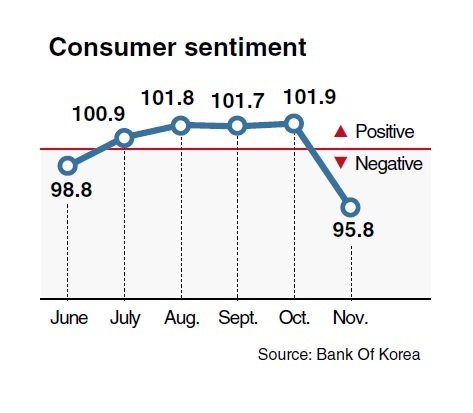South Korea’s consumer sentiment in November is the worst since the 1998 Asian financial crisis, reflecting people’s growing fear over the already weak economy.
According to the Bank of Korea’s data, the composite consumer sentiment index plunged to 95.8 in November, the lowest since April 2009 when it was 94.2. A figure below 100 means pessimists outnumber optimists.
It was the first time in five months that the index fell below 100 since June at 98.8.

The survey was conducted on 2,056 households throughout the nation’s urban areas from Nov. 11 to 18.
People’s sentiment toward future economic conditions in the next six months plummeted to 64 in November from 80 a month earlier. It was the lowest level since it marked 64 in March, 2009.
The sentiment index on future job opportunities also went down to 68 from 79 over the same period.
Households were also pessimistic on savings and household debt. An index toward future savings fell to 92 from 94 and the sentiment toward future household debt increased to 100 from 98, the BOK’s survey showed.
While consumers expected the inflation to be about 2.5 percent for the next 12 months, they said public utilities and house rent fees will be the largest contributing factors to inflation.
The gloomy consumer sentiment comes as the economy is being rocked by influence-peddling scandals involving President Park Geun-hye and her confidante Choi Soon-sil.
Private economists have revised down growth forecasts for Korea next year to as low as 2.2 percent, amid increased uncertainties from US President-elect Donald Trump’s protectionism in trade.
Korea’s runaway household debt, estimated to have exceeded a record high of 1,300 trillion won as of the end of October, is weighing on consumer sentiment as well.
A report by the Hyundai Economic Research Institute noted that the high level of household debt will cut private consumption growth by 0.63 percentage points next year.
By Kim Yoon-mi (
yoonmi@heraldcorp.com)








